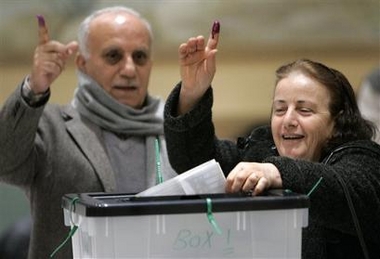|
Iraqis go to the polls in 15 countries
(AP)
Updated: 2005-12-14 08:26
Iraqi expatriates voting Tuesday for a parliament in their homeland said they
want stability and an end to the violence in Iraq.
But the voters åK½ï¿½ in 15 countries around the world åK½ï¿½ were as divided on how to
get there as as their communities are back home.
Strong voter turnout was seen in polling stations around the world, including
in Syria, Jordan and Iran, where Associated Press reporters witnessed heavier
turnout compared to Iraq's landmark January elections. Official turnout figures
were not immediately available.
Sunni Arab, Shiite and Kurdish concerns were reflected among many of the
Iraqis living in neighboring countries, Europe and the United States. Voters
came from all stages of their country's stormy past åK½ï¿½ those who fled Saddam
Hussein's rule, and others who left amid the 2003 U.S.-led invasion or took
refuge abroad from the relentless bloodshed that followed.

Raheel Mariam, of Sterling Heights, right,
raises her ink-stained finger while voting as her husband Gorgees Marcos,
left, looks on at the Iraqi national elections voting center in Farmington
Hills, Mich., Tuesday, Dec. 13, 2005.
[Reuters] | Iyad al-Iraqi, 22, a Sunni Arab voting
in the Jordanian capital, Amman, said he hoped the elections would bring more
"Muslim Arabs" to power.
"We hated living under Saddam, but at least it was safer then. Give us a
thousand like Saddam, but not a single American to rule us," he said.
Sunnis at home and abroad largely shunned Jan. 30 elections for an interim
parliament that wrote the nation's constitution åK½ï¿½ Iraq's first free vote in
decades. The result was a legislature dominated by members of the Shiite Muslim
majority and the strong Kurdish minority.
This time Sunnis in Iraq were pressing for a strong turnout to build their
numbers in the 275-member legislature åK½ï¿½ and the response in predominantly Sunni
Jordan and Syria suggested the communities there were answering the call.
Voting also appeared heavy among Iraqis in mainly Shiite Iran, a close ally
of the Shiite parties that control the current government in Baghdad. Hundreds
lined up at a polling station in southern Tehran to cast ballots.
|